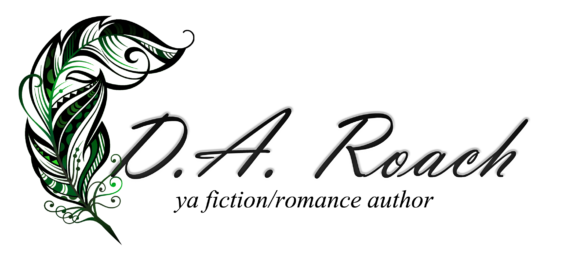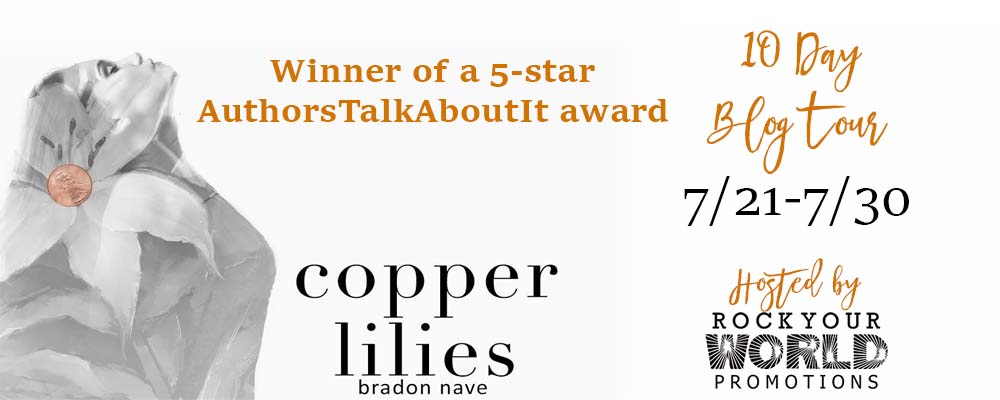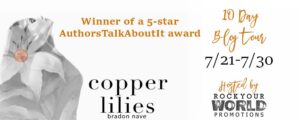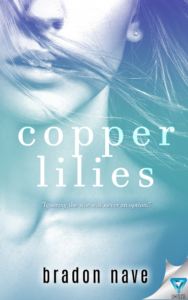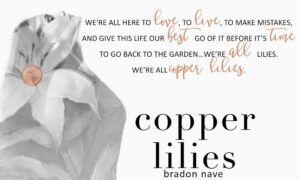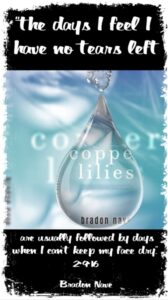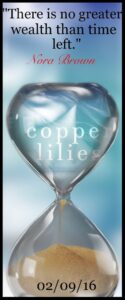Title: COPPER LILIES
Author: Bradon Nave
Genre: NA Coming of Age
Date of Publication: February 9, 2016
Complacent and bored with her life in rural Oklahoma, Nora leaves her bigoted father and all she’s ever known to pursue a new life in San Francisco. At the height of the AIDS epidemic, Nora, a registered nurse, believes she can be an asset to the community. Bunking in a tiny apartment with a longtime friend, Nora secures a job within a large hospital and begins volunteer work for an organization that cares for those afflicted with the disease.
She is soon faced with the horrors of AIDS—a reality she wasn’t quite prepared for…
Just as the courageous group of caregivers and volunteers have their emotional strength depleted to the point of no return, the group rallies together and pushes forward, remembering their mission—if they aren’t there for these people, who will be?
Nora wasn’t expecting to find him here, to “fall in love among the ashes…”
Along her journey, she meets a diverse community of lionhearted survivors. And then there’s Donald, another volunteer who fights alongside those with dwindling hope. Nora and Donald grow closer as the war on HIV rages around them.
They watch their friends waste to nothing, yet no answers are being offered. The only comfort is the solace they find in each other. After months of hardships, another crippling loss shakes the foundation of Nora’s faith.
Their struggle is not only about HIV/AIDS—but about how the nation responds, and the humanistic choice to be unsung heroes.
“A beautifully written reminder that draws attention to a chronic disease that still needs to be fought on the front lines as stigma/judgment remain.” -Amy Nelson, MPH, CHES HIV/AIDS Educator
EXCERPT #1
I was lucky I had him. I didn’t move to San
Francisco in search of love. I would frown upon
someone for falling in love among ashes. Perhaps I
wasn’t actively seeking love; rather, longevity. It
seemed nothing was solidified; nothing was
guaranteed to return a smile the following day. Even
if it were not my pain, per se, to simply witness the
pain of loss from afar was enough to plummet my
ailing psyche back into the pit it was attempting to
crawl out of. Donald was my rope. A thin rope at first,
but our threads were growing in number. I had to be
sure I didn’t hang myself.
After spending the rest of the day together, Donald
and I ended our day’s adventure in the confinements
of his bedroom. He laid me down on his bed, gently
kissing my neck, and I knew without a doubt that the
interaction would go no further than heated kissing
and clothed entanglement. I made that abundantly
clear prior to his closing of the bedroom door. There
would be no raunchy stories for Gwen to salivate over
the following morning. I didn’t feel dirty, and for
once the oppression of guilt momentarily subsided. I
was allowed to find mild pleasure without feeling
disgraceful or distasteful.
His touch brought a rush similar to the feeling I’d
experienced on country Oklahoma roads with local
high school all-stars a few years prior, but there was
something much more. The physical effects he had on
my body were coupled with the idea that he might be
something solid. That he might be there day after day.
That he might not fade away.
“You’re beautiful,” he whispered.
“You’re hairy,” I replied hastily, evoking a
chuckle. “You’re beautiful too.”
“Beautiful?” He momentarily halted the tongue
massage on my neck.
“Handsome. Hairy and handsome.”
“And a distraction?”
The question caught me off guard. Initially I
assumed he’d be little more than that, a distraction. A
distraction from everything going on around me.
Gradually, I had accepted the idea that exploring
realms beyond friendship and preoccupation with this
gentleman was something I could be okay with. “No.
Yes and no. What am I?”
“A girl,” he said playfully, scanning my face for
hints.
“You’re not just a distraction. Something to take
my mind off of Buddies and the hospital, yes; but I
like you.”
“Me too.”
“You too?”
“I like you. But you’re my escape. Sometimes I
feel like there’s no escape. I can either close my eyes
and see their faces, see Toby’s face, or I can see
yours. I miss him. Maybe I miss him too much.”
His eyes were dry yet flooded with pain. There was
no way the average farm boy from rural Texas could
digest losing one of his closest friends in such a short
period of time. Had he been back home and his buddy
been killed in an accident, Donald would have had
monumental support and guidance throughout the
grief process. Here, everyone had a Toby, a Logan, all
of our friends were losing friends. Attempting to share
feelings with our social group would only add turmoil
to their grief-stricken lives.
“I can be that. I’d like to be that,” I muttered as I
kissed him.
The passion left our fingertips quicker than it
mounted in them. He ran the tip of his index finger
under my eye, tracing it to my earlobe. It was as if we
bottled the explosive emotions for another night and
took comfort in companionship. I wasn’t trying to be
a hero, but I certainly wasn’t trying to write a love
story either. At this point, I was comfortable moving
through this experience with this person and allowing
myself a temporary reprieve from my constant over
analyzing—whatever happens, happens—just let it be,
and it will be.
EXCERPT #2
Then I felt his hand take mine. Something about it
felt comforting. Comforting like the smell of baked
rolls after a Sunday stroll by the wheat fields.
Comforting like the noise of tractor motors echoing
out over an early country Oklahoma summer morning.
It felt like home. It hit me then; Donald felt like home.
Not the bad parts of home, the blessed parts. The parts
I longed for in my dreams. Selective memory can be
an ass sometimes. The warmth of his hand, his firm
grasp—so confident and unwavering, reminded me of
the country roads I loved. The ones I missed. The
ones that subtracted the cynical and led to graceful
fishing ponds and green fields clad with Holstein
cattle.
I squeezed his hand gently, assuring him I didn’t
find the advance to be creepy. I knew the chocolate
and wine would always be there, and good books
were in no shortage. I didn’t need clichés. I certainly
didn’t need to be one. I just needed to be comforted,
and Donald did that with a simple gesture that seemed
to change my frame of mind entirely. Had the two of
us met in different circumstances, the ‘spark’ might
have advanced much sooner. Something about
seeking love or even committed companionship on a
romantic level while wading through turmoil and grief
seemed off-putting, in poor taste, or even impossible
for some to psychologically digest. I allowed my
weathered mind to momentarily desist.
Looking upon the group of dancers in front of us,
dancing in a novice-fashion to Patsy Cline, I rested
my head on his shoulder. As his cologne entered my
nostrils, I felt him gently kiss the top of my head. That
was it; I decided then that he would lead. I didn’t care
how well he danced.
EXCERPT #3
The building smelled of stale cigarettes and
mildew. Prior to witnessing the shocking details of the
illness stapled to many patron’s faces, I took note of
the irony while walking into the meeting. The
members were seated in discarded church pews. So
much judgment and homophobia flooded from the
doors of many of the churches back home, yet their
retired property served the ‘sinners.’ The ‘sinners,’
some sad, some skeletal, all desperately clinging to
every word spoken into the raggedy microphone. A
few of them had raspberry-colored lesions on their
faces, necks, foreheads, and other exposed areas—
Kaposi sarcoma. I’d seen the pictures of ‘Gay Cancer’
years earlier in the newspapers, but seeing this
ailment merely feet from me sent an ache through my
psyche. They weren’t sinners, at least not any more
than I was. They were scared. I was scared. And I was
angered. It was in that moment I knew I’d waste no
more time attempting to converse or reason with the
ignorant bigots—the men and women that smiled and
praised this horror as a ‘sign of the times.’
When he smiled at me and picked his brochures up
for me to sit next to him in the pew, I literally wanted
to cry. I wanted to hug him.
AIDS; hearing it said aloud on the news and
primetime specials on television put a deep, stigmadrenched
fear
in many people. As I looked at him, a
man more than likely my age, I didn’t see anything to
be scared of. His mannerisms and the way he quickly
avoided eye contact gave me the impression that he
was self-conscious, fearful of how I would respond to
his offer to sit. This is why I wanted to cry. This man,
nearly a boy, was riddled and depleted to a state of
fragility that left him resembling a victim of end-stage
anorexia. He was faced with death, a cruel death of
wasting and withering to nothing. He was faced with a
disgusting hate from many of his fellow Americans—
a hate that would no doubt be written in history books
one day. He wasn’t a cancer patient, surrounded by
loved-ones whilst cloaked in a symbolic cape of
heroism. Oh no, to so many he was the symbol of
death, of fear, of sin and of disease. Not to me. I only
saw an insecure human that could possibly benefit
from my smile and my handshake.
That was the light. The dark, dreadful light—a
small glimmer attempting to point me to my role in
the war.
As I sat by him, I gently touched his shoulder as
my backside met the cold pew. He smiled once more
as I extended my hand to greet him.
“I’m Logan,” he whispered. His tight skin
appeared almost incapable of completely covering his
eyes and teeth. His diminished profile and defeated
slouch left me drowning in a dreadful state of sorrow.
I was quick to remind myself that this was not about
me or my feelings. I wasn’t the one facing death.
“Logan, I’m Nora. This is my first time here.
Thank you so much for letting me sit with you, I’ve
been on my feet all day.”
“Don’t mention it. Depending on what day you
come, this place can get wall to wall.”
“When is the best time to come?”
“It just depends on who passes that day. Or if
anyone passes at all.”
“Passes what?”
“Dies. If quite a few pass, it seems to draw a bigger
crowd. It’s a good chance to remember them. We
light candles and pray.”
I knew then that Logan must have prayed to the
same God I did. I touched him on the top of his frail
hand in a gentle manner. “Where did you get the
handouts?”
“Right where you walk in. Gwen, the blonde, is
standing by the table.”
“You know Gwen?”
“For sure. Everyone knows Gwenny,” he said
softly, smiling again as he looked toward the floor.
The thought of anyone being mean to this person
made absolutely no sense to me. He seemed so kind.
He must have been horrified—not the kind of horror
one might endure whilst being chased by a dog, or
narrowly escaping a car accident alive—a chronic
horror, of which there is no escape. He had to watch
his friends waste and die right before his eyes. All the
while, knowing that their fate was his own. How
could one not commend his bravery?
“Have you always lived here?” I asked.
“Oh no. I’m from Ohio. I came out here when I
was sixteen.”
“Sixteen? You come with your parents?”
“Parents? I don’t have those anymore.”
“I’m sorry.”
“Don’t be. Awful human beings. The only thing
that separates us from animals is our ability to love
unconditionally. Once that’s gone, we’re nothing
more than animals. I’ve said that so many times, but
the last thing I remember seeing when I left their
home was our dog, Tork, wagging his tail and
following me. He loved me. He loved me
unconditionally.”
“Dogs are great,” I said solemnly. I was at a loss
for words, incapable of comforting him. All I wanted
to do was make some piece of his story a small bit
better, and I didn’t know how. He was the first of
many encounters that would leave me dumbfounded,
but most importantly, he was the first. The moment I
stopped thinking about it, my natural ability to
comfort my own species took over. He continued
looking toward the floor; occasionally he would look
at the speaker near the front of the room. As
background music began and the congregation began
singing some song I’d never heard, I gently placed my
arm across his shoulders in a soft, one-armed
embrace—patting the shoulder farthest from me with
my hand.
Like a parched sponge, Logan seemed to readily
absorb my offering of kindness. Leaning into me, his
eyes swelled with tears, his thin bottom lip quivered,
and he cried. We cried. I offered him a full embrace.
This man, this stranger, was so deprived of affection it
seemed to overw
helm him.
helm him.
As I cradled the crying man, I looked about the
room. My actions had caught the attention of some
onlookers. Some of us were advocates, familiarizing
ourselves with what we needed to advocate for; some
of us were educators, unsure of what we were
educating on; and some of us were dying—of what,
we didn’t understand. But through the mixture it
remained completely clear: we were all humans—
frightened, fragile humans.
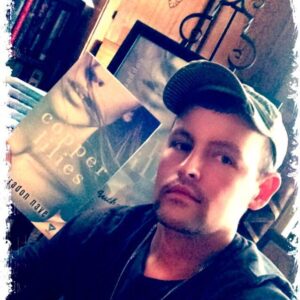 Bradon Nave was born and raised in rural Oklahoma. He attended a small country school during junior high and high school, and graduated with only three people in his class. After graduate school, he decided to devote his spare time to his passion of writing.Bradon currently lives in Piedmont, Oklahoma, with his wife and two young children.
Bradon Nave was born and raised in rural Oklahoma. He attended a small country school during junior high and high school, and graduated with only three people in his class. After graduate school, he decided to devote his spare time to his passion of writing.Bradon currently lives in Piedmont, Oklahoma, with his wife and two young children. When he’s not writing, he loves running, being with friends and family, and being outdoors.
– LINKS –

